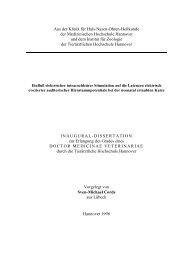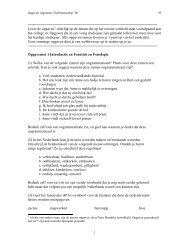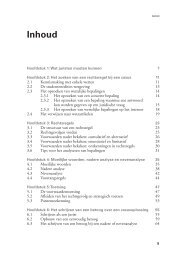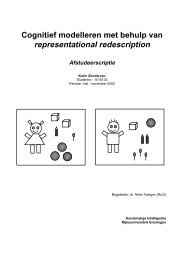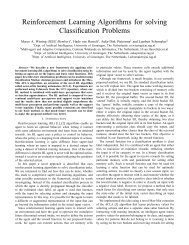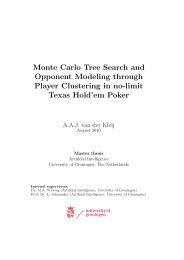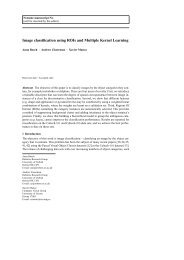Presuppositions in Spoken Discourse
Presuppositions in Spoken Discourse
Presuppositions in Spoken Discourse
You also want an ePaper? Increase the reach of your titles
YUMPU automatically turns print PDFs into web optimized ePapers that Google loves.
Chapter 4<br />
This makes determ<strong>in</strong><strong>in</strong>g resolution difficult. For the abstract objects there<br />
were no examples where the abstract antecedent was surface-identical with the<br />
presupposition-trigger<strong>in</strong>g expression, though examples where they were quite<br />
similar were given <strong>in</strong> the last section. But for many examples it is difficult to have a<br />
clear <strong>in</strong>tuition about how an <strong>in</strong>terpretation as b<strong>in</strong>d<strong>in</strong>g and an <strong>in</strong>terpretation as<br />
accommodation will affect the truth-conditional mean<strong>in</strong>g of the utterance. Because<br />
of this we have to look for other collaborat<strong>in</strong>g evidence that the <strong>in</strong>duced<br />
presupposition needs to be, or is perceived as, bound. These clues can be found <strong>in</strong><br />
the reaction of the discourse participants, or <strong>in</strong> the rhetorical or discourse effect<br />
that seems to be <strong>in</strong>tended.<br />
For some of the cases we also have to expla<strong>in</strong> <strong>in</strong> part why a speaker would<br />
choose to use a bound presupposition. Given that we generally expect speakers to<br />
use shorter anaphoric expressions if the mean<strong>in</strong>g will be the same, it follows from<br />
the Gricean maxim of quantity that speakers don’t need to say more than is<br />
necessary. We need an explanation, therefore, for why speakers would choose to<br />
use presuppositional expression if an anaphoric expression was possible.<br />
In the follow<strong>in</strong>g sections I will first present evidence where presuppositions<br />
have functional traits similar to anaphoric counterparts, and then show additional<br />
examples which illustrate that bound presuppositions are functionally more<br />
versatile <strong>in</strong> their different roles, be<strong>in</strong>g more precise and clearer than their anaphoric<br />
counterparts. This also gives us an explanation of why speakers would choose to<br />
use bound presuppositions even if they could have used an anaphoric expression.<br />
This should be evidence that bound presuppositions and anaphor are of the same<br />
k<strong>in</strong>d, but they are also different <strong>in</strong> that presuppositions have more utility, an ability<br />
that stems from their additional descriptive content.<br />
4.3.1 Bound presuppositions make more precise references to abstract<br />
objects<br />
Do <strong>in</strong>duced presuppositions of abstract objects behave or function <strong>in</strong> a similar way<br />
to anaphoric expressions that refer to abstract objects? If the answer to this<br />
question is yes then we can say that we have found additional evidence to consider<br />
presuppositions and anaphors to be of the same k<strong>in</strong>d. But <strong>in</strong> order to fully<br />
understand if this analogy is an accurate one, we need to look at some examples of<br />
abstract object anaphors <strong>in</strong> the corpus to see how they behave. I’ll first present two<br />
examples from an additional excerption done on the LLC corpus of abstract object<br />
anaphors that appeared as the complement of factive verbs. Abstract anaphors also<br />
appear <strong>in</strong> other segments <strong>in</strong> different environments and I’ll discuss these as well.<br />
After this data is presented, I’ll give several examples of <strong>in</strong>duced presuppositions<br />
that have similar, but additional functions. 9<br />
In the follow<strong>in</strong>g example the abstract object anaphor refers to a portion of<br />
the <strong>in</strong>formation contributed by the previous utterances.<br />
9 Some of this work was first presented <strong>in</strong> Spenader (2001c).<br />
76



